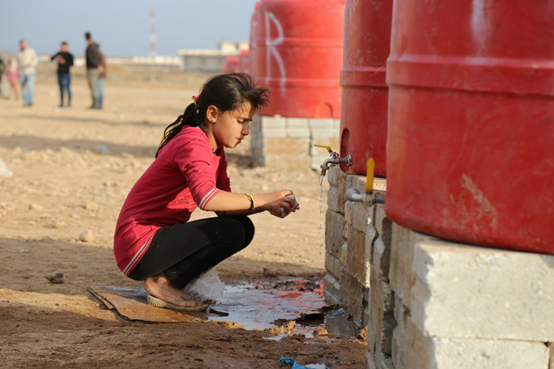Dealing with the outbreak of coronavirus is hard enough in countries at peace. For hundreds of thousands of people living in north east Syria, fighting the pandemic is complicated by the fact that their water has been cut off.
The Turkish-backed Syrian National Army (TSNA) has been cutting off the water supply to over 460,000 people in Hasakah for the last few weeks. The TSNA has closed down the Allouk pumping station in the border area, according to UNICEF. The shutdown is being used as leverage in negotiations between the TSNA and the Kurdish-led autonomous administration. According the local sources, in return for opening the pumping station, the TNSA is demanding electricity for the areas under its control.
This isn’t the first time the Allouk water station has been out of commission. The station, located a few hundred meters from the Turkish border and close to Ras al Ayn, was hit by Turkish strikes in October 2019, effectively shutting down the water to large parts of Hasakah. It has since been repaired.
Double disaster
Bassam al-Ahmad, director of Syrians for Truth and Justice and a PAX partner, says, “The people in Syria have already suffered from years of conflict, resulting in a crumbled infrastructure, including many displaced people in camps. Civilians don’t have any alternative water sources. This is an unusual time, with many NGOs that provided aid leaving after the US-pull out, and now with the COVID-19 virus spreading. The shutdown of water creates a double humanitarian disaster. All people should have equal access to water.”
Call on UN and EU
PAX is concerned that access to essential infrastructure such as water is being used against the civilian population and calls upon Turkey to stop this practice. Therefore we support the joint statement by 50 civil society groups that calls on the UN, the US and the EU to pressure Turkey to provide water, to put the Allouk water station under neutral control, and to guarantee that all citizens in north eastern Syria have equal access to water.
Little information on coronavirus
Last week PAX also co-signed a letter from Syrian and international organisations calling on the UN and the EU to increase efforts to protect IDPs in Northwest Syria from the coronavirus. Meanwhile, civilians in the areas under control of the Assad regime have no access to information about the spread of the coronavirus in the country as the regime has only reported a limited number of cases. The situation will also be discussed in the UN Security Council.
Access to water is a human right
Under international law, access to water is a human right, and cannot be used by States or non-state actors as weapon to pressure civilian populations or other actors. Occupying powers, under the Geneva Conventions, also are obliged to ensure and maintain public health and hygiene services. Lack of access to water prevents the civilian population from enjoying these rights. There has been a disturbing trend in Syria and Iraq by various actors to weaponize water. This has resulted in serious security and health risks for local populations.
Read more about PAX’s work in Syria
Read more about PAX’s work on Conflict and the Environment




